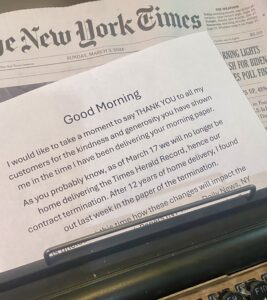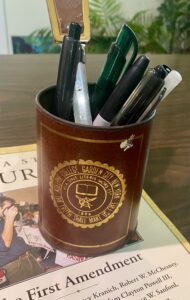Note to Dems: Time to Rally the Troops
Wednesday, February 12th, 2025By Bob Gaydos
Got my now-weekly letter from the Democratic National Committee urging me to make my 2025 Membership Contribution and fill out a survey to help the DNC “stop Donald Trump’s dangerous agenda.”
Couple of problems here:
- I am not now and never have been a member of the Democratic Party, or any political party for that matter. I am a registered voter and have been since I was eligible to vote more than 60 years ago. I’m not sure today, but it used to be the common practice among journalists not to register in any political party to avoid obvious complaints of bias. My opinions and leanings as an editorial writer may have been clear, but there was no way to claim favoritism to a particular party. Same with my work as a reporter or editor. So I’m not sure where the DNC got the idea that I’m a Democrat and decided to make me a pen pal, but I’m officially a registered Independent voter in Sullivan County, N.Y., and I like it that way.
- The first question on the survey is: “Which of President Trump’s priorities do you find most troubling? (Please choose up to three.) The list includes eight of Trump’s more publicized and nasty talking points, from mass deportations to cutting taxes for the rich, gutting abortion access, limiting voting access, reversing environmental regulations, targeting the rights of LGBTQ+, dismantling federal agencies and stocking the Supreme Court with unqualified MAGA puppets.
Umm, I’m troubled by all of them, folks, as I’ve written. But what troubles me the most about Trump is that he clearly has no grasp of separation of power and in fact shows no interest in sharing it with Congress or the courts.
He has somehow, at least for the moment, been usurped as president by Elon Musk, who is running amok through any agency he sees as a threat to his lust for more power and money. And he seems to know even less than Trump about how government (at least ours) is supposed to function.
And Democrats are being way too polite about it. Yes, the lawyers and civil liberties groups are doing their job, taking Trump to court and winning rulings from judges, at least temporarily stopping Trump.
But we need Democrats jumping up an down and getting people in the streets and on TV and social media with the same message, over and over. And I guess I’m actually answering the second question in the DNC survey: Which aspects of the Trump presidency do you find most disturbing?
Easy. “His disregard for the U.S. Constitution.” All the other stuff stems from his ignorance, cowardice, greed, pettiness, narcissism, dishonesty and obviously failing mental faculties. They all carry a price for Americans. But the ultimate price is lack of freedom and an unchecked Trump beholden to an autistic billionaire with no loyalty to anything but himself is the ultimate threat to American democracy. And someone needs to make a lot of noise about that.
Wall Street doesn’t care. So-called mainstream media no longer cares, or at least the one-time big names in credibility have put away their knives and First Amendment privileges out of fear and greed. What else could it be?
The Constitution is under attack and Republicans don’t care. I’ve been writing that message for a long time now, having declared the death of the Republican Party in 2016 when it knelt meekly at the feet of Trump.
Perhaps that’s why someone in the DNC mistakenly thought I was a registered member of the party. Sorry, no. I just want my Senators, Chuck Schumer and Kirsten Gillibrand, and all the rest of the Democrats to take to the ramparts and use whatever weapons they have at their command to stop this dismantling of America. Go get Musk.
Rally the people who were lied to by Trump and voted for him, the Republicans who may be hiding quietly, too embarrassed to come out and admit they were wrong, and the millions of Americans who didn’t bother to vote for president because “they’re all the same.“
No, they’re not.
(Note to DNC: Thanks for the survey. The opinions expressed here are free for you to use, but in keeping with my tradition, I’ll be making my donations to the ACLU, SPLC and other apolitical organizations fighting to defend and preserve the Constitution.)








